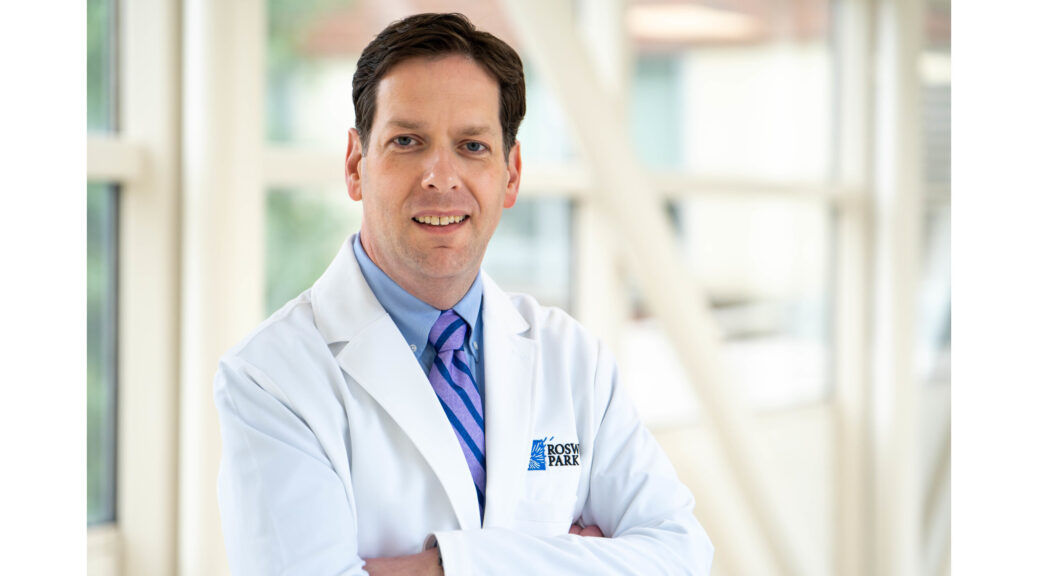Though JAK inhibition has been shown to be effective in GVHD treatment, this trial addressed whether JAK inhibitors have a role in GVHD prophylaxis (prevention). To find ways of preventing acute GVHD, investigators have looked toward the potential of JAK2 inhibitors — drugs that can “turn off” JAK2, a gene that promotes inflammation and contributes to the development of GVHD. The investigational anti-inflammatory drug pacritinib is a JAK2 inhibitor. The JAK1/2 inhibitor ruxolitinib (brand name Jakafi) is indicated for the treatment of refractory GVHD.
The new publication reports findings from a collaborative team of investigators from Roswell Park, the University of Minnesota’s Masonic Cancer Center and Moffit Cancer Center in Florida. The team conducted a phase 2 clinical trial to determine whether adding the Janus kinase 2 (JAK2) inhibitor pacritinib (brand name Vonjo) to the anti-inflammatory drugs sirolimus (brand name Rapamunel) and tacrolimus (brand name Prograf) could prevent acute GVHD in patients who have undergone alloHSCT.
“JAK inhibitors are active in treating GVHD that does not respond to steroids,” explains Dr. Betts. “But the question over the past 10 years has been whether JAK inhibition could prevent GVHD.”
He and his colleagues found the answer in the phase 2 results of a phase 1/2 clinical trial (NCT02891603) that enrolled patients who underwent alloHCT for the treatment of hematological malignancies or myeloproliferative neoplasms — conditions in which the body produces too much of a specific type of blood cell. Twenty-eight patients in the phase 2 study were treated at the University of Minnesota and Moffitt Cancer Center with a regimen of pacritinib/sirolimus/tacrolimus (PAC/SIR/TAC), a combination that the phase 1 study had determined to be safe.
Patients received pacritinib on the day of transplant (Day 0) and for the following 70 days. Sirolimus, an mTOR inhibitor, was administered the day prior to transplant and then daily for at least one year. Tacrolimus, a calcineurin inhibitor, was given three days before transplant and continued for at least 50 days.
The biologic endpoint of the trial was successful, in that PAC/SIR/TAC reduced JAK2 activity in donor T cells, as well as the development of Th1/Th17 cells, thought to be implicated in GVHD onset. Despite achieving this immunologic effect, the incidence of grade 2-4 acute GVHD was very similar to what had been achieved in the past with the use of SIR/TAC alone (46% vs. 43%), demonstrating that adding pacritinib to the regimen did not improve prevention of GVHD.
“We show that JAK inhibition with pacritinib does what we expect immunologically,” says Dr. Betts. “It suppresses JAK2/STAT3 activation and Th1/Th17 cells. However, less-selective approaches like the use of cyclophosphamide after transplantation appear to afford deeper and more durable immune tolerance.”
“This work highlights critical biologic differences between GVHD treatment and GVHD prevention,” he notes. “While our phase 2 trial shows that JAK inhibition with the sirolimus/tacrolimus regimen does not actually prevent GVHD after all, we are eager to see how this combination performs in treating chronic GVHD.”
From the world’s first chemotherapy research to the PSA prostate cancer biomarker, Roswell Park Comprehensive Cancer Center generates innovations that shape how cancer is detected, treated and prevented worldwide. Driven to eliminate cancer’s grip on humanity, the Roswell Park team of 4,000 makes compassionate, patient-centered cancer care and services accessible across New York State and beyond. Founded in 1898, Roswell Park was among the first three cancer centers nationwide to become a National Cancer Institute-designated comprehensive cancer center and is the only one to hold this designation in Upstate New York. To learn more about Roswell Park Comprehensive Cancer Center and the Roswell Park Care Network, visit http://www.roswellpark.org, call 1-800-ROSWELL (1-800-767-9355) or email [email protected].
Media Contact
Ann E Deck-Miller, Roswell Park Comprehensive Cancer Center, 7168458593, [email protected], roswellpark.org
SOURCE Roswell Park Comprehensive Cancer Center


